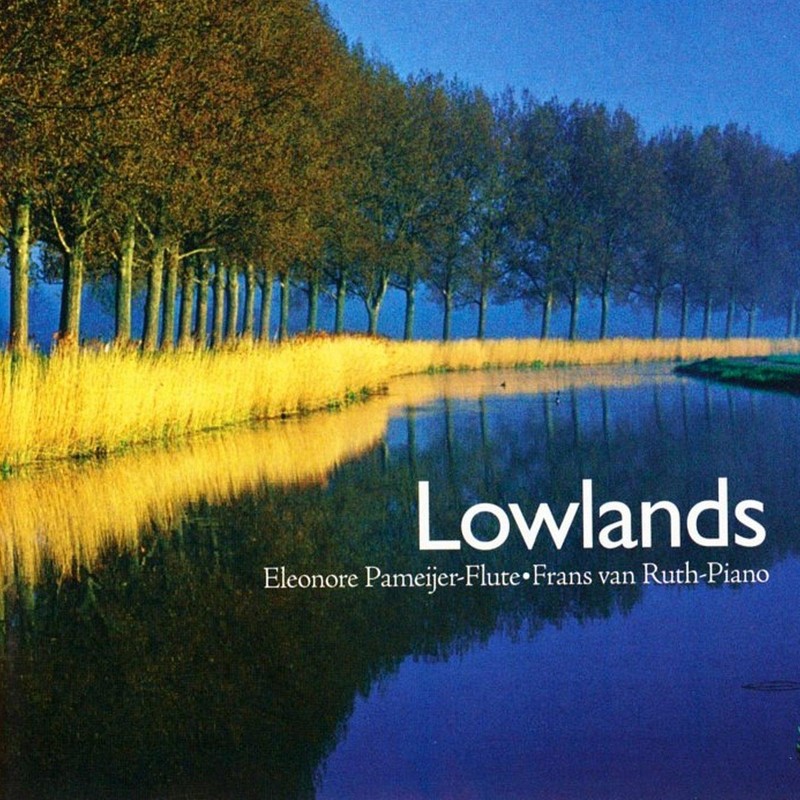
Lowlands
Eleonore Pameijer、Frans van Ruth
2007-02-01
专辑简介
Highlights from the Lowlands
Dutch painting is world famous. Every year, thousands of tourists flock to the Lowlands to admire paintings by Rembrandt, Vermeer, Frans Hals, Van Gogh and Mondriaan. How different is the fame of Dutch music! After Jan Pieterszoon Sweelinck, born in 7562, not a single Dutch composer has been able to achieve lasting success outside of the Netherlands. Yet there is no lack of talent among Dutch composers. Especially in the beginning of the 20th century, Dutch music had its own distinctive signature and there was a robust musical culture. Holland had always been susceptible to the powerful cultural influences of its larger neighbors, France and Germany. This was certainly true in the 19th century when Holland was under the sway of German musical traditions. This began to change towards the beginning of the 20th century with French music becoming more popular, although this was partially due to the strength of a new school of French composers, the political and cultural climate in the Netherlands was also changing. Directly prior to the Second World War, an affinity to French music even became a kind of political statement, an opposition towards the upcoming Nazi regime. In the final analysis, after absorbing these foreign influences, Dutch music eventually became recognizable in itself: characterized by being concise, direct, unembellished and often having a typically Calvinistic sobriety, after the Second World War, a radically new musical esthetic began taking over. This was partially because a large group of composers, many of them Jewish, had perished during the war. The younger generation quickly filled the vacuum, claiming modernism as the watchword of the day. Next to this new avant-garde music, the music of the pre-war generation seemed hopelessly outdated. Most of the Dutch music from the first half of the century was neglected and looked down upon. But times change: in 1996 Eleonore Pameijer and Frans van Ruth established the Leo Smit Foundation, named after the Dutch composer Leo Smit (1900-1943). Their purpose was to offer a platform for this forgotten music, believing in the quality of the pre-war generation of Dutch composers. The Foundation organizes a monthly concert series at the in Amsterdam, the repertoire on this double CD has all been successfully performed by the duo Pameijer and Van Ruth in the Uilenburger Concert series. The sieve of time is an effective mechanism in music. If good music disappears as a result of changing esthetics and styles, it will sooner or later reappear because of its intrinsic quality, it is only now, at the beginning of the twenty-first century, that this music can take its rightful place in the stream of music history.
专辑曲目
1
I. Allegro
Eleonore Pameijer、Frans van Ruth
2
II. Lento
Eleonore Pameijer、Frans van Ruth
3
III. Presto
Eleonore Pameijer、Frans van Ruth
4
I. Allegro, molto deciso
Eleonore Pameijer、Frans van Ruth
5
II. Poco lento
Eleonore Pameijer、Frans van Ruth
6
III. Allegro
Eleonore Pameijer、Frans van Ruth
7
I. Introduzione, Maestoso
Eleonore Pameijer、Frans van Ruth
8
II. Intermezzo, andante quasi lento
Eleonore Pameijer、Frans van Ruth
9
III. Fughetta, allegro vivo
Eleonore Pameijer、Frans van Ruth
10
I. Cortège des marionettes
Eleonore Pameijer、Frans van Ruth
11
II. Pastorale
Eleonore Pameijer、Frans van Ruth
12
III. Capriccio
Eleonore Pameijer、Frans van Ruth
13
I. Grave, Allegro con moto
Eleonore Pameijer、Frans van Ruth
14
II. Lento con espressione
Eleonore Pameijer、Frans van Ruth
15
III. Grave, allegro grazioso
Eleonore Pameijer、Frans van Ruth
16
I. Cadenza
Eleonore Pameijer、Frans van Ruth
17
II. Sonatina
Eleonore Pameijer、Frans van Ruth
18
III. Lamento
Eleonore Pameijer、Frans van Ruth
19
IV. Rondo alla francese
Eleonore Pameijer、Frans van Ruth
20
I. Introduzione
Eleonore Pameijer、Frans van Ruth
21
II. Lentissimo e elegiaco
Eleonore Pameijer、Frans van Ruth
22
III. Giocoso
Eleonore Pameijer、Frans van Ruth
23
I. Allegro
Eleonore Pameijer、Frans van Ruth
24
II. Lento
Eleonore Pameijer、Frans van Ruth
25
III. Allegro moderato
Eleonore Pameijer、Frans van Ruth
26
Epilogue
Eleonore Pameijer、Frans van Ruth
27
Rondo Capriccioso
Eleonore Pameijer、Frans van Ruth
28
I. Incantazione
Eleonore Pameijer、Frans van Ruth
29
II. Allegro capriccioso
Eleonore Pameijer、Frans van Ruth
30
III. Incantazione II
Eleonore Pameijer、Frans van Ruth
31
IV. Cancion
Eleonore Pameijer、Frans van Ruth
32
V. Incantazione III
Eleonore Pameijer、Frans van Ruth
33
VI. Passacaglia
Eleonore Pameijer、Frans van Ruth
34
I. Allegro moderato
Eleonore Pameijer、Frans van Ruth
35
II. Adagio molto
Eleonore Pameijer、Frans van Ruth
36
III. Allegro scherzando
Eleonore Pameijer、Frans van Ruth
37
IV. Finale, allegro vivace
Eleonore Pameijer、Frans van Ruth
38
I. Lento molto
Eleonore Pameijer
39
II. Allegro assai
Eleonore Pameijer
40
III. Adagio
Eleonore Pameijer
41